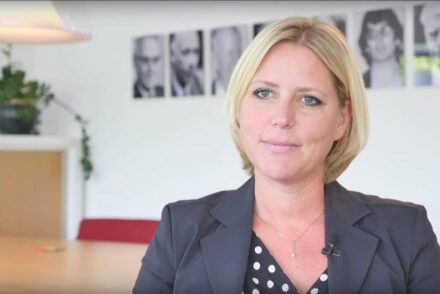Stimuli, stimuli, stimuli: Anouk de Beijer had a panic attack during the TOP Week
New city, new study, new stimuli: for highly sensitive students, the start of student life can be overwhelming. Former Tilburg University student and influencer Anouk de Beijer (27) shares her experiences with high sensitivity and offers tips on maintaining your boundaries during TOP Week and the rest of your student life.

For many young people, student life is a time of freedom and discovery, but also of chaos, social pressure, and new responsibilities. For Anouk de Beijer, the Tilburg introduction week—the so-called “TOP Week”—felt like a real plunge into the unknown. “On the first day, we gathered in a huge gymnasium, where we were divided into groups, with a ‘TOP mom or dad’ as our supervisor.”
A fun but intense experience. “Days full of activities followed: pub crawls, games on a large lawn, an obstacle course, walks through the city with stops at food stalls. Everything revolved around connecting and fitting in. The stimuli piled up. I tried to join in, but I started having panic attacks,” Anouk says.
So, she went home for a night to de-stress. “I temporarily stayed with a former classmate in the city, but decided to go to my parents’ for one night. A little peace and quiet. A break. That moment of retreat was exactly what I needed.” The next day I returned relieved.’
Setting boundaries
“High sensitivity isn’t a condition, but a personality trait,” Anouk explains. “So it’s not something you have, but something you are. It’s part of who you are.” She believes people are on a spectrum, with some barely sensitive to stimuli, while others react extremely sensitively to their environment. Highly sensitive people (HSPs) perceive more stimuli per second and process them more deeply.
For Anouk, this means, among other things, that loud noises, bright lights, or itchy clothing throw her off balance more quickly. But emotional stimuli also hit her more intensely. “When a friend experiences something intense, it sometimes feels like I literally feel her pain.” Worrying and empathy also play a major role in her daily life.
Self-knowledge and maintaining physical and mental boundaries have been crucial to Anouk’s personal growth. For example, she started working with a coach and spoke with a psychologist to organize her thoughts and learn to listen to herself more.
An important lesson: stop comparing yourself to others. “If you constantly choose what others do, you’re living a life that doesn’t suit you. You can’t sustain that.” For Anouk, that sometimes meant skipping drinks, going home early, or spending an evening alone. She also learned that it’s okay to be open about it. “People often understand better than you think.”
Influencer
Anouk works three days a week at the office and dedicates the rest of her time to her own business. On Instagram and TikTok, she shares candid videos and stories about high sensitivity with over 40,000 followers. What started as a spontaneous post grew into a platform full of recognition and connection. Hundreds of young women identified with her words and shared their own experiences. “I thought: wow, there’s really a huge demand for this.”
For Anouk, it became clear: she wanted to do more with her story. “With every post, I want to convey that it’s okay to be yourself and be vulnerable.” As a young person, she herself craved that kind of openness. “All I had was a book about high sensitivity. Nothing about it was shared on social media.”
Tips for students
For students who may be highly sensitive, she’s happy to share some advice that has helped her. First of all: recognize that it’s okay to be nervous. You don’t have to experience introduction week as “the best week of your life.” It’s okay if it feels overwhelming. It’s also important not to compare yourself to others. Feel what you need and make room for it. Even if that means skipping an evening to unwind.
“Also, say out loud that you’re nervous,” Anouk advises. “To a friend, parent, or TOP mom or dad.” It’s also good to stay aware of your boundaries throughout the academic year: take a break after a full day of classes, go for a walk, or eat a small snack during your break. “That helps you clear your head and refocus.”
And finally: “Be flexible in what works for you. Whether you move out of your own home, stay at home, or choose a quiet living situation with one roommate. Anything is fine, as long as it suits you.”






